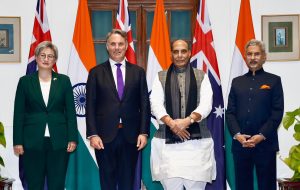India has had a busy couple of weeks. Following the India-U.S. 2+2 strategic dialogue in early November, India had another 2+2 with Australia last week. New Delhi hosted the second edition of the India-Australia Foreign and Defense Ministerial Dialogue on November 20. Australian Deputy Prime Minister and Defense Minister Richard Marles and Foreign Minister Penny Wong were in New Delhi for extensive discussions with their Indian counterparts, Defense Minister Rajnath Singh and External Affairs Minister S. Jaishankar. The ministers also held separate bilateral talks with their counterparts.
The Australia-India relationship has grown tremendously in the last three years, especially considering that the two countries elevated their relationship to a comprehensive strategic partnership only in June 2020. The inaugural round of 2+2 ministerial dialogues between the two countries took place in September 2021. That India engages in 2+2 ministerial level strategic dialogues only with a handful of countries (the U.S. and Japan being two of them; not coincidentally they are also Quad partners) reflects the significance of Australia in India’s strategic calculations.
In the inaugural dialogue in 2021, India and Australia signed a military logistics agreement that would provide the two militaries reciprocal access to each other’s military bases for repair and replenishment, in addition to such agreements strengthening familiarity between forces that facilitates strengthened defense cooperation.
Prior to his trip, Marles noted the significance of the India relationship by saying that “Our cooperation with India is at the heart of Australia’s approach to ensuring the Indo-Pacific remains open, inclusive and resilient.” He also pointed to other advances in the relationship including an Indian submarine visit to Perth and Australia’s hosting of the Malabar exercise.
At the bilateral meeting between Singh and Marles, the two agreed that there is a case for enhanced partnership on key technology areas such as cyber security, artificial intelligence, anti-drone and anti-submarine warfare, as well as beefing up their cooperation on both Maritime Domain Awareness (MDA) and subsurface domain awareness. Further, the two ministers highlighted defense industry collaboration as an important facet of their growing partnership. Singh is reported to have proposed ship building, ship repair and maintenance, as well as aircraft maintenance, repair, and overhaul as potential areas of cooperation.
The two ministers also agreed to joint research in underwater technologies, and partnership between defense start-ups from the two countries. Singh and Marles further noted that “a strong India-Australia defense partnership will augur well not just for the mutual benefit of the two countries but also for the overall security of the Indo-Pacific.”
The two foreign ministers also met separately, holding the 14th Foreign Ministerial Framework Dialogue on November 21 where they reviewed the state of the bilateral comprehensive strategic partnership as well as exchanged views and perspectives on a number of important developments in the region and beyond. Speaking about the bilateral meeting between the two foreign ministers, Jaishankar said that they “had a very good discussion,” pointing to “a real momentum” in the partnership. Similarly, Wong, the Australian foreign minister, was equally upbeat, saying that 2023 is “a milestone year in our partnership, and it’s critical for the net region.”
The 2+2 Dialogue’s joint statement indicates substantive progress in the bilateral relationship. The statement noted “the positive and increased momentum of the India-Australia Comprehensive Strategic Partnership.” In a subsequent press briefing, Jaishankar noted that the 2+2 Dialogue with Australia “is reflective of the growing and deepening engagement between our two countries.” He highlighted the many firsts in the relationship in 2023 including the entry into force of the Economic Cooperation and Trade Agreement, the first annual summit, two visits by the Australian prime minister, and closer trade, cultural, and economic relations. The two sides also agreed to open new consulates, another indication of the growing non-security component of the relationship.
But the security component remains strong. Jaishankar said that the two countries “shared growing convergences with Australia,” including “a shared commitment to a free, open, inclusive, prosperous and rules-based Indo-Pacific region, based on UNCLOS, as the constitution of the seas.” These and other sentences that stressed the rules-based order in the Indo-Pacific were clearly aimed at China, which was certainly prominent in the minds of both sides. But other global issues also made an appearance, with the joint statement noting “deep concern over the war in Ukraine and its tragic humanitarian consequences” and “their support for a comprehensive, just, and durable peace in Ukraine that upholds all the Purposes and Principles of the U.N. Charter.”
There is little doubt that two countries have grown enormously close to each other, especially in the strategic areas. Both look at each other as vital partners, with Canberra and New Delhi playing critical roles in maintaining peace and stability in the Indo-Pacific. In fact, the strategic interests and concerns about a belligerent China appear to be keeping the relationship on a strong footing despite possible troubles around issues like the alleged Indian government role in the killing of Sikh separatist Hardeep Singh Nijjar in Canada or even some concern on both sides about the politics of the Indian diaspora in Australia.

































